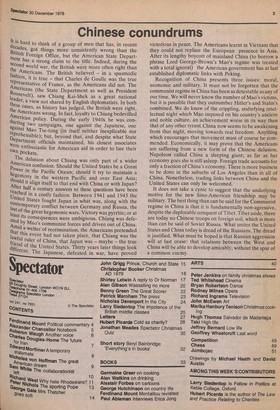Chinese conundrums
It is hard to think of a group of men that has, in recent decades, got things more consistently wrong than the British Foreign Office, but the American State Department has a strong claim to the title. Indeed, during the second world war, the British were more often right than the Americans. The British believed — in a spasmodic fashion, it is true — that Charles de Gaulle was the true representative of France, as the Americans did not. The Americans (the State Department as well as President Roosevelt), saw Chiang Kai-Shek as a great national leader, a view not shared by English diplomatists. In both these cases, as history has judged, the British were right, the Americans wrong. In fact, loyalty to Chiang bedevilled American policy. During the early 1940s he was conducting two campaigns, one against the Japanese, one against Mao Tse-tung (in itself neither inexplicable nor reprehensible); but, beyond that, and despite what State Department officials maintained, his closest associates Were enthusiastic for American aid in order to line their OW n pockets.
The delusion about Chiang was only part of a wider American confusion. Should the United States be a Great Power in the Pacific Ocean; should it try to maintain a hegemony in the western Pacific and over East Asia; Should it align itself to that end with China or with Japan? After half a century answers to these questions have been reached in a costly fashion. Between 1941 and 1945 the United States fought Japan in what was, along with the c. ontemporary conflict between Germany and Russia, the _last of the great hegemonic wars. Victory was pyrrhic; or at least its consequences were ambiguous. Chiang was defeated by Mao's communist forces and driven out of China. Amid a welter of recrimination, the Americans pretended that this event had not taken place, that Chiang was the lawful ruler of China, that Japan was — maybe — the true friend of the United States. Thirty years later things look different. The Japanese, defeated in war, have proved victorious in peace. The Americans learnt in Vietnam that they could not replace the European presence in Asia. After its lengthy boycott of mainland China (to borrow a phrase Lord George-Brown's Mao's regime was treated with a total ignoral) the American government has at last established diplomatic links with Peking.
Recognition of China presents three isgues: moral, economic and military. It must not be forgotten that the communist regime in China has been as detestable as any of our time. We will never know the number of Mao's victims,. but it is possible that they outnumber Hitler's and Stalin's combined. We do know of the crippling, stultefying intellectual night which Mao imposed on his country's ancient and noble culture, an achievement worse in its way than that of any other tyrant. China now seems to be awakening from that night, moving towards real freedom. Anything which encourages that movement must of course be commended. Economically, it may prove that the Americans are suffering from a new form of the Chinese delusion. Napoleon called China a sleeping giant; as far as her economy goes she is still asleep. Foreign trade accounts for only a fraction of China's economy. There is more business to be done in the suburbs of Los Angeles than in all of China. Nonetheless, trading links between China and the United States can only be welcomed.
It does not take a cynic to suggest that the underlying motive for the new Sino-American friendship may be military. The best thing than can be said for the Communist regime in China is that it is fundamentally non-agressive, despite the deplorable conquest of Tibet. Tibet aside, there are today no Chinese troops on foreign soil, which is more than can be said of Soviet Russia. What unites the United States and China today is dread of the Russians. The dread is justified. What must be hoped is that Russian aggression will at last cease: that relations between the West and China will be able to develop amicably, without the spur of a common enemy.






















































 Previous page
Previous page